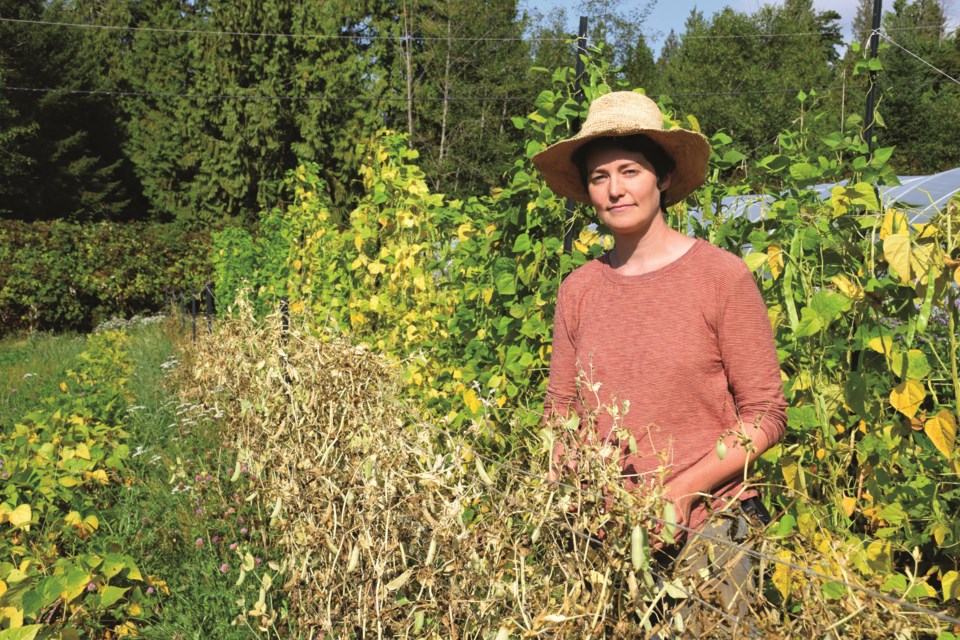Commercial farmers on the Sunshine Coast may have their wish granted by the Sunshine Coast Regional District (SCRD): eligible farms could now automatically have a two-week exemption at the beginning of Stage 4 water restrictions.
Suggested changes to the water conservation regulations on the Chapman water system come after the summer of 2021 saw an extended drought trigger the earliest and longest period of Stage 4 water restrictions for the SCRD at 41 days. At the time, farmers sought and were granted a two-week exemption from Stage 4 water restrictions in August – the height of the food production season. (The exemption did not apply to hobby farms, community gardens or backyard gardens. Essential water is already exempt for livestock.)
At the Feb. 3 infrastructure meeting, SCRD directors all voted in favour of granting a two-week exemption at the start of Stage 4 for farmers that are classified as commercial under the BC Assessment Act, are metered and pay commercial water rates.
“A two-week exemption is not a big deal in terms of the total volume of water, and I think it shows our commitment to local food production,” Elphinstone director Donna McMahon said.
Halfmoon Bay director Lori Pratt also voiced her support for an exemption, saying she understands “how difficult a mistress the weather can be” and is in favour of “however we can support our local growers, especially in light of all of the damage B.C. farms have experienced over the last few months.”
There are currently 11 farms located within Sechelt that are not metered, general manager of infrastructure services, Remko Rosenboom, said. They would have time to become metered and therefore become eligible for the exemption.
The 2021 exemption was granted to metered commercial farms registered under the BC Assessment Act. Thirteen farms registered for the exemption between Aug. 21 and 31. In January of this year, after farmers were hit by a different kind of seasonal weather, the Sunshine Coast Farmers Institute requested the two-week exemption from Stage 4 be made permanent.
SCRD staff will also be engaging with the community to help define commercial farms in SCRD regulations and will report back to a committee meeting in the third quarter of this year with the intent to implement any changes as of Jan. 1, 2023.
More water conservation regulations
At the same meeting, directors also moved to include changes to more water conservation regulations after staff presented their review of the drought response plan and the Water Rates and Regulations Bylaw No. 422.
Some of these changes include “updating terms and definitions, adding new regulations in Stage 2 and 3 to limit times to water trees, shrubs, flowers by hand or drip-irrigation, and eliminating Temporary Lawn Watering Permits.”
Drip-irrigation systems are being preferred over micro-irrigation systems because they operate with less pressure and use less water.
Previously, hand watering, micro- and drip-irrigation systems were not restricted during water conservation Stages 1 through 3. But staff and members of the public noted “a significant amount of water use can occur when no limits are in place, even with efficient watering technologies or watering by hand,” the report states.
“High temperatures drive more hand watering and drip-irrigation during times of extended drought. Based on public complaints and staff observations, defining maximums for watering times and promoting watering during times of lower evaporation is recommended.”
Times allowing hand watering and drip irrigation are being introduced with up to four hours per day during Stage 2 and up to two hours per day during Stage 3, and only within set hours.
Following several non-compliances reported around temporary lawn watering permits in 2021, staff also recommended removing the permit option from the bylaw and only allowing lawn watering two days per week between 7 and 8 a.m. after May 1 (when Stage 1 comes into effect). In 2021, the SCRD issued a total of 56 temporary lawn watering permits, 27 of which were still active in Stage 2.
The report explained that temporary permits “issued during the onset of drought conditions are not likely to support the successful establishment of new lawns during high temperatures and low soil moisture” and that spring and September typically provide good growing conditions.
The SCRD’s Water Rates and Regulations Bylaw No. 422 is expected to be amended to accommodate these changes at a future board meeting. Any changes will be communicated to the public.



